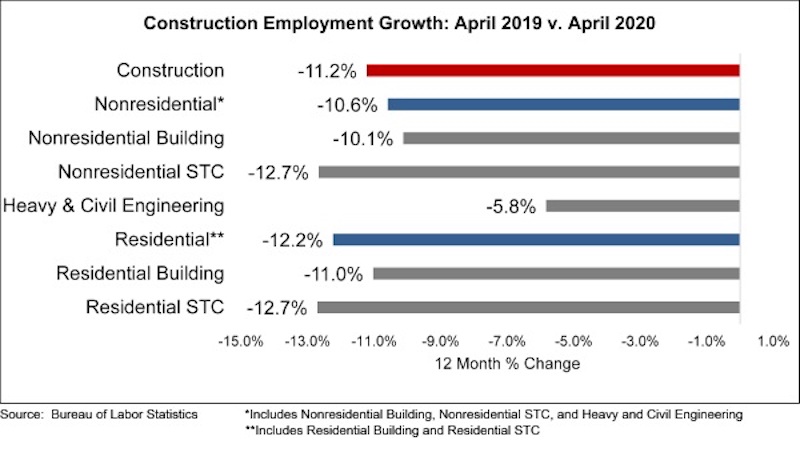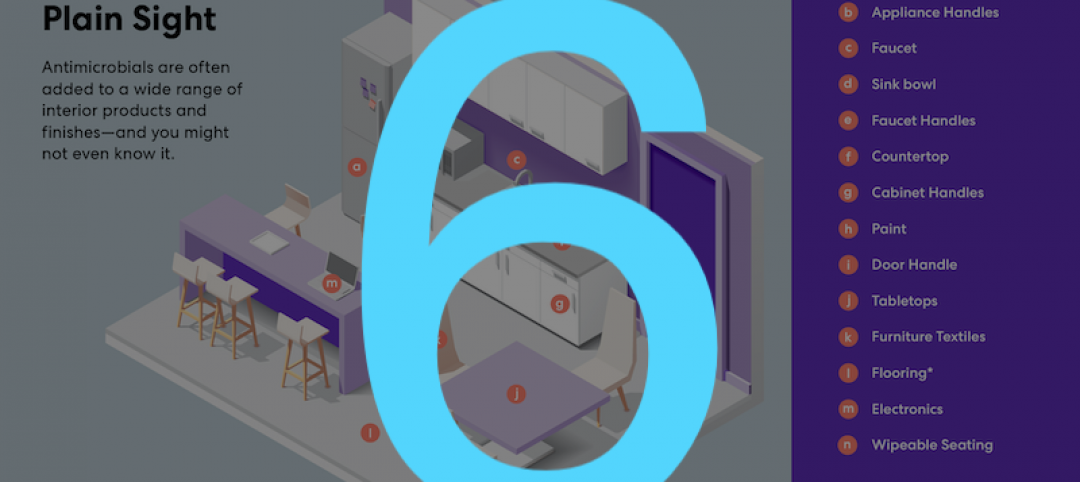The construction industry lost 975,000 jobs on net in April, according to an Associated Builders and Contractors analysis of data released today by the U.S. Bureau of Labor Statistics. This was the largest recorded decrease in construction jobs since the government began tracking employment in 1939, despite construction remaining an essential industry in much of the nation through April.
Nonresidential construction employment lost 560,500 jobs on net in April. There were job losses in all three nonresidential segments, with the largest decline registered among nonresidential specialty trade contractors, which lost 393,100 jobs. Nonresidential building lost 88,500 jobs, while heavy and civil engineering lost 78,900 jobs.
The construction unemployment rate was 16.6% in April, up 11.9 percentage points from the same time last year. Unemployment across all industries rose from 4.4% in March to 14.7% last month. This was the highest rate since the BLS started tracking unemployment in 1948. Because of technical reasons related to the BLS survey and a classification error in several responses, the unemployment rate is probably closer to 20%.
“The hope had been that construction activity would hold up well given the industry’s classification as an essential industry in much of the nation and the presence of substantial backlog coming into the crisis, which stood at 8.2 months in February, according to ABC’s Construction Backlog Indicator,” said ABC Chief Economist Anirban Basu. “But alas, in large measure, those hopes were not realized. The level of construction industry job loss in April easily surpassed that of the worst month sustained during the Great Recession, when 155,000 jobs were lost in March 2009. Between April 2006 and January 2011, construction industry employment declined by 2.3 million. The construction industry lost nearly a million jobs last month alone.
“Based on a combination of business confidence indicators, initial unemployment claims and other emerging data, May will represent another month of crushing construction employment loss,” said Basu. “Project postponements and cancellations are now commonplace, with construction backlog failing to be the protective shield that it normally is during the early stages of economywide recession.”


Related Stories
Market Data | Jun 11, 2020
5 must reads for the AEC industry today: June 11, 2020
Istanbul opens largest base-isolated hospital in the world and AIA issues tools for reducing risk of COVID-19 transmission in buildings.
Market Data | Jun 10, 2020
6 must reads for the AEC industry today: June 10, 2020
Singapore's newest residential district and CannonDesign unveils COVID Shield.
Market Data | Jun 9, 2020
ABC’s Construction Backlog Indicator inches higher in May; Contractor confidence continues to rebound
Nonresidential construction backlog is down 0.8 months compared to May 2019 and declined year over year in every industry.
Market Data | Jun 9, 2020
6 must reads for the AEC industry today: June 9, 2020
OSHA safety inspections fall 84% and the office isn't dead.
Market Data | Jun 8, 2020
Construction jobs rise by 464,000 jobs but remain 596,000 below recent peak
Gains in may reflect temporary support from paycheck protection program loans and easing of construction restrictions, but hobbled economy and tight state and local budgets risk future job losses.
Market Data | Jun 5, 2020
7 must reads for the AEC industry today: June 5, 2020
The world's first carbon-fiber reinforced concrete building and what will college be like in the fall?
Market Data | Jun 4, 2020
7 must reads for the AEC industry today: June 4, 2020
Construction unemployment declines in 326 of 358 metro areas and is the show over for AMC Theatres?
Market Data | Jun 3, 2020
Construction employment declines in 326 out of 358 metro areas in April
Association says new transportation proposal could help restore jobs.
Market Data | Jun 3, 2020
6 must reads for the AEC industry today: June 3, 2020
5 ways to improve cleanliness of public restrooms and office owners are in no hurry for tenants to return.
Market Data | Jun 2, 2020
Architects, health experts release strategies, tools for safely reopening buildings
AIA issues three new and enhanced tools for reducing risk of COVID-19 transmission in buildings.

















